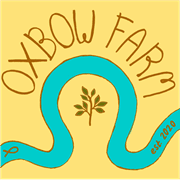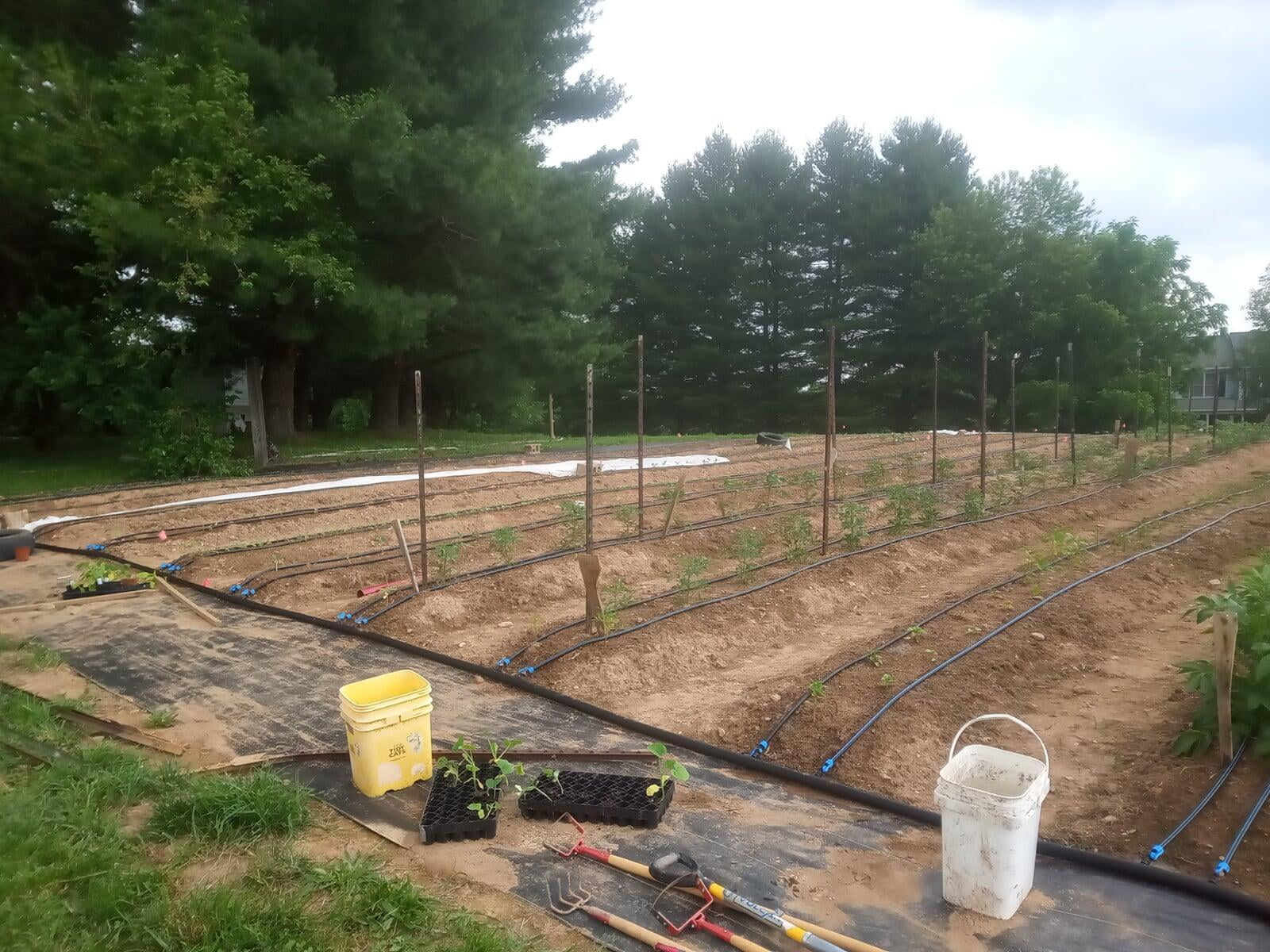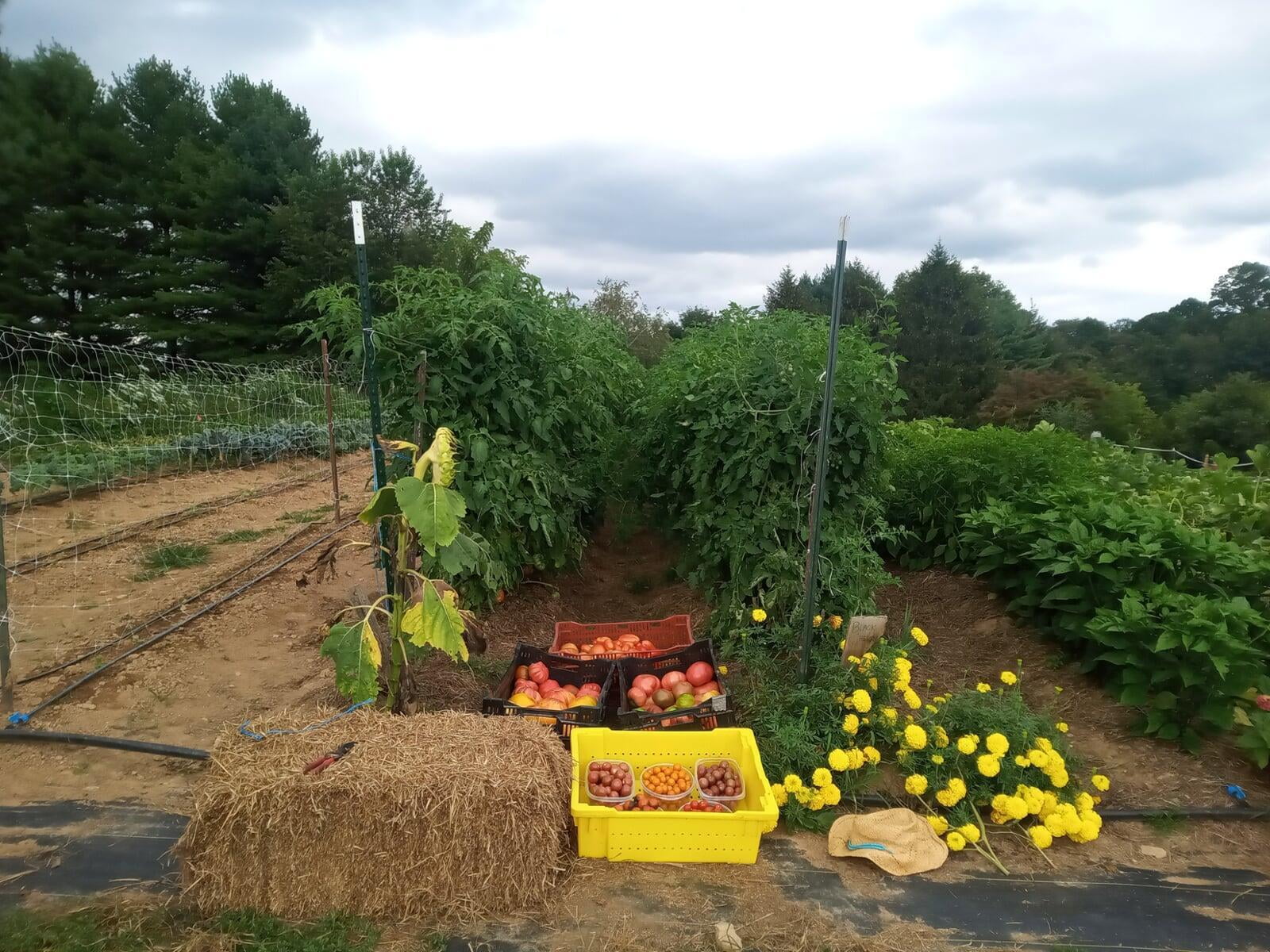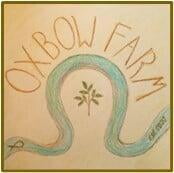What is Integral Ecology?
We do our best to manage our land as a practice of integral ecology. Although Pope Francis does not formally define the term, he notes that “An integral ecology includes taking time to recover a serene harmony with creation, reflecting on our lifestyle and our ideals, and contemplating the Creator who lives among us and surrounds us” (LS 225). Integral comes from the Latin integer which means whole. Ecology comes from “oikos” which means home, and “logos” which means logic. Thus integral ecology is the logic of the whole home, understanding ourselves to be at home on the land.
Integral Ecology Blog
We often have conversations around the farm about topics at the intersection of farming, faith, ecology, and economics. We'd been talking about starting a blog for a while, so here it goes!

To Carry the Dying of Jesus: On Death and Resurrection
Last spring, my husband and I found out that we were pregnant for the first time. Like most parents, we were awestruck and overjoyed about the prospect of bringing new life into the world, but also overwhelmed. When we went into the dark room for our first ultrasound at 8 weeks, the nurse quickly found the heartbeat and we saw our baby moving around on the screen, but after just a few seconds she left to go consult with the doctor. The doctor was very honest and compassionate in explaining that our baby had a fatal development defect- a problem with the skull called anencephaly. Babies with this condition never survive long after birth, usually just a few hours.
John and I had already agreed that if we had a child with any kind of disability, we would accept it and figure it out. We didn’t even know it was possible to be in a situation where the baby would likely make it to term only to die shortly after birth. When I read more about anencephaly online, both medical articles and personal blog experiences, I saw that some women prayed for miracles and others prayed for miscarriages. There are no recorded cases of long-term survival with anencephaly, and the ultrasound images were clear, no room for error in the diagnosis. I didn’t know what to pray for, or how to explain to people why we chose to carry the baby, but I knew I wasn’t carrying to term out of some remote hope for a miracle. I believe that God can and does work miracles, but I think it is misguided to root our faith in the hope that God will take away our suffering with a miracle, rather than to trust in the miracle of the presence of Jesus through our suffering.
A few nights later when I couldn’t sleep, I remembered a verse that had struck me as an odd sort of mystery years ago in Bible study. I opened my Bible and kept pondering this verse throughout the pregnancy: “Continually we carry about in our bodies the dying of Jesus, so that in our bodies the life of Jesus may also be revealed” (2 Corinthians 4:10). What does it mean to carry about in our bodies the dying of Jesus? Didn’t Jesus already die and rise from the dead? Why would we be called to carry something that is dying? Isn’t our God the God of life? The image always seemed odd to me.
And there I was, carrying in my body a baby that I knew was dying. It wasn’t just that my baby was going to die after birth; the baby was, in a sense, already dying. The neural tube (the precursor to the spine and skull) was supposed to close at week 4 and it didn’t. By our 8-week ultrasound, the brain tissue was still growing and developing, but over the course of the pregnancy it would deteriorate due to exposure. By the time of birth, babies with anencephaly often only have a functioning brain stem left for basic autonomic functions (breathing, heart rate, reflexes, some sensory perception). The doctors didn’t know enough to tell me whether my baby would feel pain.
We started calling our baby Frances because it could be a male or female name and we didn’t want to wait until week 20 for a name. At the 20-week ultrasound when we found out that Frances was a girl and saw her beautiful face for the first time, we decided on Noel as a middle name because her due date was Christmas Day. Advent took on a new meaning for us.
I took a course on the Theology of Aquinas in the fall because I've been interested in Aquinas for a while, and I get tuition remission at Loyola since John is a professor there. Naturally, I wrote my term paper on the nature of death and suffering. Frances Noel and I spent many days together pondering the question by the fire. Something that I love about Christianity and especially the Catholic faith is that it does not shy away from suffering. The modern day “problem of evil,” is a common reason that people give for being agnostic or atheist. How can a good God know that the evils we see in this world would happen, and choose not to stop them even though he has the power to do so? This is not a question that early Christians gave much thought. The evils of death and suffering were expected, even promised to followers of Jesus if you read the Bible closely.
There are many arguments that can be made on death and suffering, and I don’t want to repeat my term paper here, but I will share the most compelling answer to the problem of evil that I have found. Aquinas explains that “this is part of the infinite goodness of God, that He should allow evil to exist, and out of it produce good” (ST 1.2.3 ad 1). Tolkien states it more poetically in the Silmarillion, a prequel to the Lord of the Rings. He begins with an imaginative retelling of the creation story in Genesis in which God, rather than speaking the world into being, sings it into being. God invites his choir of angels to participate in the song. Satan desired greater influence than the part was assigned to him, so he introduced notes of discord and began to sing his own song. God nevertheless weaves the noise of chaos into a complex harmony with solemn undertones and greater depth of beauty that is even more glorious than the original song.
This sorrowful but deep and mysterious sort of beauty is the best way I can describe what giving birth to Frances was like. It felt like time had stopped ticking and instead flowed into a raw and beautiful song. In the days leading up to the birth, things around the house were chaotic. Between our families and my best friend, we had 12 people, three dogs and our cat staying at the farm. A lot of our pipes froze in the cold snap before Christmas so we were down to one bathroom and no hot water to do the dishes, and it was hard to keep the house warm enough with just a wood stove. The day before I went into the labor, everyone came together to make sure there was enough firewood for the house, the animal chores would be covered, and they even took a list of projects to work on while we were at the hospital.
The delivery went as well as it could have; we even got to walk the Saint Francis prayer garden and go to daily mass in the hospital chapel while I was waiting to go into labor. Baby Frances was born on December 27th and died the next day. She was very weak at first, the nurse couldn't find a pulse, but she spit up and started breathing when John picked her up to do an emergency baptism. One of the first things Frances did was grab onto the St. Thomas metal that my dad had given me when he died. She met her grandmas and her aunts and uncles, and despite being delayed by a blizzard, her grandpa got to hold her before her burial. We cherished every breath in the short time we had with her, and her breaths got farther and farther apart as the time of her death drew near. Since I had carried her for nine months, I gave her over to John to carry her home.
We had a small funeral in the barn and buried her at the farm the next day. When we came home from the hospital, the plumbing was fixed, along with other things around the house, our bedroom had finally been repainted, and a big family meal was waiting for us. Everyone played a part in funeral preparations the next day. The sunrises and sunsets were all amazing during the days of her birth, death, and burial, and everything was more beautiful and peaceful than we could have hoped for.
I wouldn’t have chosen any of this if you asked me how I wanted to bring my child into the world when I first found out I was pregnant. I had no idea how I was going to get through it, but I trusted, and felt closer to the kingdom of God than I had from any other experience on this earth. I’m sure Mary wouldn’t have chosen to give birth in a barn, and Jesus made it clear in his prayer to the Father in the Garden that death by crucifixion wasn’t his first choice either: “Not my will, but yours be done” (Luke 22:42). To be clear, I don’t believe that God directly wills for any evil to happen, most of the time he simply chooses not to intervene when he could. Nevertheless, God somehow brings goodness out of evil that is mysteriously greater than what could have been had the evil never happened.
Because of Frances, I realized that to carry the dying of Jesus means to hope in the Resurrection. I didn’t feel the need to cultivate the desire for resurrection until I felt death. When we walk down to Frances’ grave, I am reminded that a part of me is buried there. Her soul is in heaven, but her flesh was once my flesh, and now it is buried. She is a small and fleeting contribution to the earth, but in the Communion of Saints she is eternal. We carry the dying of Jesus every time we care for those who are disabled, or poor, lonely; when we make sacrifices for those who cannot repay us (Luke 14:12-14). This is how the life of Jesus is revealed: resurrected into eternal life with wounds gloriously transfigured. When we pray by the grave these quiet winter mornings, the first birds remind us spring is coming; we hear the song of life slowly returning to the forest. We await the resurrection. Frances is the reason that I more deeply know what I mean when I say the Creed in Mass every Sunday: “I look forward to the resurrection of the dead and the life of the world to come.”

The Importance of the Resurrection for Integral Ecology and Christian Virtue
In my previous (and first) blog post, I talked about what it means to “carry the dying of Jesus,” and how this relates to hope in the resurrection. My overall intention with this blog is to write on integral ecology, which is faith-based understanding of our mission to live in harmony with God, neighbor, and the earth. So what does resurrection have to do with ecology?
There is a long history of caring for the earth within the Christian tradition. Pope Francis surveys some of this history in his 2016 encyclical, Laudato Si. Many Christians consider being environmentally conscious as part of our call in Genesis 2:15 to “till and to keep” the earth, and part of being a good neighbor. Pope Francis says:
“some committed and prayerful Christians, with the excuse of realism and pragmatism, tend to ridicule expressions of concern for the environment. Others are passive; they choose not to change their habits and thus become inconsistent. So what they all need is an “ecological conversion”, whereby the effects of their encounter with Jesus Christ become evident in their relationship with the world around them. Living our vocation to be protectors of God’s handiwork is essential to a life of virtue; it is not an optional or a secondary aspect of our Christian experience” (LS 217).
But what exactly is it about living an ecological lifestyle that is essential to Christian virtue? I think the key to answering this question is in the ultimate end for ourselves and (I believe) the rest of creation, which is the resurrection. Many people mistake heaven as the ultimate end for us. While it is true that our purpose is to spend eternal life with God, being with God “in heaven” after death is not an eternal destiny. As Catholics, we believe that at the end of time, “heaven” will meet earth, and our bodies will be resurrected and reunited with our souls.
Christians have long been criticized for abusing the earth. Some of this abuse is motivated by a theology that views the earth as a temporary means to our eternal end. In this view, the earth simply exists to sustain our bodies as vehicles for our souls, so that we can live to know God and get to heaven. It doesn’t matter what we do to the earth in the meantime, except maybe insofar as pollution might harm our neighbors. Most major Christian traditions (the Catholic Church included) don’t have a stance on whether there will be non-human life with God in the resurrection. Saint Thomas Aquinas, though he is my favorite theologian, has speculations on this question that I disagree with. He argues that other life forms won’t be a part of the new heavens and the new earth because they exist simply to serve man’s bodily needs, but the stars and the planets will because they “serve man in the sense that by their beauty and enormous size they show forth the excellence of their Creator” (SS 170). Clearly Aquinas did not study the glorious complexity of soil microbial ecology, or many other natural systems which not only suggest evidence of a Creator but are simply beautiful and testify to God’s goodness in and of themselves.
In my opinion, scripture overwhelmingly indicates that a great diversity of God’s creatures, if not every species ever created, will together glorify God at the end of time. The diversity and complexity of organisms that have no direct interaction with or utility for humanity is baffling, and that’s not even to mention the billions of years of evolution filled with the flourishing and extinction of species that preceded the existence of humans on the planet. How could their final ends or purposes all be mediated through human needs? What a wonderful song it would be, if as Revelation foretells: “every creature in heaven and on earth and under the earth and in the sea, and all that is in them” (5:23) are singing blessing, honor, and glory to the Lord forever.
That being said, nature itself is clearly broken, riddled with violence, death, and decay, and our human tendencies towards greed and war are a part of our broken nature. While we have a lot to learn from nature, it does not hold the answers to all of our problems, and according to Saint Paul, it too is groaning in anticipation of the life of the world to come:
“creation itself will be set free from its bondage to decay and obtain the glorious liberty of the children of God. We know that the whole creation has been groaning in travail together until now; and not only the creation, but we ourselves, who have the first fruits of the Spirit, groan inwardly as we wait for adoption as sons, the redemption of our bodies” (Romans 8:21-23).
With this view in mind, the logic of, “we live in a broken world and God will take care of it at the end of time” as an excuse for our culture of indifference is ridiculous. To think, “what’s one more plastic wrapper blowing away in the wind?” given that there is a floating island of garbage the size of Texas in the Pacific Ocean is a moral hazard. Is that garbage heap a manifestation of God’s will? Probably not. Who’s going to clean that up at the end of time? Probably God! That logic is the equivalent of giving up on a striving for personal virtue because God can (and already has) cleansed us of sin through Jesus. Sure, we all fall short and make up excuses for ourselves at times, but we don’t embrace these excuses as a healthy part of Christian theology. In the same way that God has already freed us from the slavery of sin so that we can more fully love God and our neighbors, God has already given us the wisdom and gifts to live in more beautiful harmony with the rest of creation. Practicing this harmony in whatever incomplete and fumbling ways that we can in our daily lives is an essential part of Christian virtue.
This idea also applies to issues regarding reverence for human life, caring for the poor and vulnerable in society that some would call hopeless causes. When my husband and I got a fatal ultrasound diagnosis for our daughter, for reasons that took me a long time to understand, I didn’t really find it comforting to hear that I would have a baby in heaven. Catholics believe that life begins at conception, so her soul was already created, and would be in heaven whether she died in the early weeks of pregnancy or whether she made it full term. What meaning is there in watching her body grow and develop, only for it to perish hours after birth? Would it be better to have a miscarriage and not prolong the process of grieving her loss? I didn’t have a deep sense of purpose about the pregnancy until I realized the hope of the resurrection, that her body (and mine) with all of our wounds and imperfections will be transfigured at the end of time. By carrying to term, I carried her just a little closer to her eternal destiny of worshipping God with her resurrected and glorified body. The body is not merely a vehicle for the soul, but it is an integral part of what makes us human, and how we will experience eternal life with God.
Likewise, the earth is the very thing on which human flourishing (both spiritual and material) depends. To the extent that care for God’s creation in this life, we are bringing the Kingdom of God (albeit in small and incomplete ways) to earth, and to the extent that we harm it, we are dishonoring God’s creative work, and inflicting wounds on the earth that God will need to heal, as well as distortions in our own hearts that will need to be reconciled. I try to envsion this when we pray the Our Father: “Thy Kingdom come, thy will be done on earth as it is in heaven.”
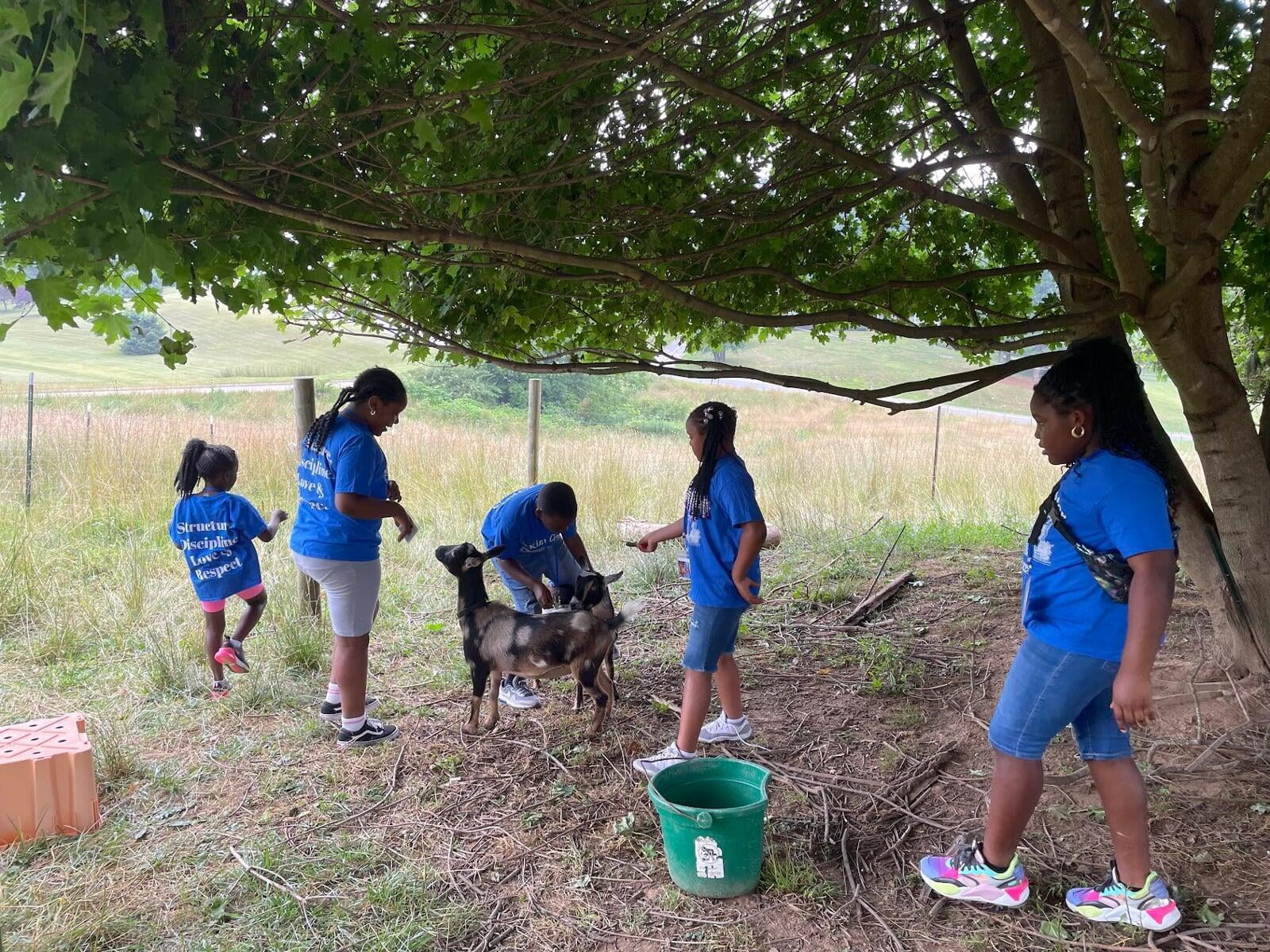
Material and Spiritual Poverty
“The mystery of the poor is this: That they are Jesus, and what you do for them you do for Him. It is the only way we have of knowing and believing in our love. The mystery of poverty is that by sharing in it, making ourselves poor in giving to others, we increase our knowledge of and belief in love.” – Dorothy Day From the April 1964 Catholic Worker.
Dorothy Day is drawing from the parable of the sheep and the goats from Matthew 25 in this quote. On judgement day, Jesus says to the sheep “Come, you that are blessed by my Father, inherit the kingdom prepared for you from the foundation of the world; for I was hungry and you gave me food, I was thirsty and you gave me something to drink, I was a stranger and you welcomed me, I was naked and you gave me clothing, I was sick and you took care of me, I was in prison and you visited me…” (Matthew 25:34-34). They ask Jesus when they did those things (for they don’t remember doing them), and he replies, “Truly I tell you, just as you did it to one of the least of these who are members of my family, you did it to me.” Likewise, he condemns those who saw the poor hungry and did not give them food, thirsty, and did not give them drink, saying “just as you did not do it to one of the least of these, you did not do it to me.”
Dorothy Day’s understanding of the mystery of poverty highlights the invitation to know and love Jesus more deeply through serving the poor. And she makes it clear that this doesn’t mean just occasionally volunteering at church events or service projects, but “making ourselves poor in giving to others.” In addition to the Gospel of Matthew, Dorothy Day’s wisdom here is drawn from her lifelong experience of living in solidarity with the poor. Together with Peter Maurin, she founded the Catholic Worker movement during the Great Depression and opened houses of hospitality where volunteers live and work with those that they are serving. They make meals together, share chores, and live as a family, because ultimately, what people on the streets need most is a family. As you can imagine (and you can read about it in her book Loaves and Fishes), Catholic Worker houses are usually full of love and chaos intertwined.
We were inspired by the Catholic Worker movement when we started our farm. I often find consolation in remembering Dorothy Days’ stories when I wonder whether what we’re trying to do is just too hard; she did so much more than we could ever imagine doing. Our mission is to provide produce, hospitality, and ecological education to anyone in material or spiritual need. How we serve those in material need is simple: we sell our produce at a half price to those who can’t afford it, and we donate produce to food pantries and other community organizations. This is financially sustainable thanks to our donors and CSA members and who opt to pay extra for their produce to sponsor.
Occasionally we host people in material need through the work-for-stay program that we participate in (Worldwide Opportunities on Organic Farms), but more often than not, the need is spiritual. Many young people come to us on summer break from school, trying to figure out what they want to do with their lives. Many are seeking answers to spiritual questions. Others are burned out from jobs in healthcare, technology, or office work, and seeking a career transition; and a few are at retirement age, hoping to start their own homestead or do more gardening as a hobby. Regardless of background, just about everyone who has come to us has found the daily rhythms and slow, sweaty work of farming to be deeply rewarding and therapeutic. There is a spiritual need that a farm seems to answer for a lot of people.
Spiritual poverty or being poor in spirit is sometimes regarded among Christians as a positive thing. We are poor in spirit insofar as we recognize our ultimate dependence on God for our fulfillment. I tend to think of spiritual poverty in a different sense, as a negative thing that applies to anyone feeling isolated from God, neighbors, self, or the earth. I think of the poverty of loneliness, those in both the crowded city and in the sprawling countryside who do not know their neighbors, those who feel they don’t have anyone to call if they need help with something. I think of the poverty of not having a place to walk through the woods, look up at the trees and let your mind wander. I think of those who work themselves sick for reputation or a pay raise when they’re already making more than enough money for themselves and their families. I think of the poverty of time, that busyness that prevents us from prioritizing friends, family, and prayer. Spiritual poverty applies to anyone who lacks the wealth of a life overflowing with love.
Sometimes there seems to be an inverse relationship between spiritual and material poverty. Both my husband and I spent time serving abroad. He did Peace Corps in South Africa, and I worked for a non-profit that served indigenous farmers in Panama for a few summers when I was in college. We both appreciated the simplicity of life in those places, and the sense of familial love that extends to everyone. Even at the Govans Farmers Market (located in a food desert in Baltimore) where we sell our produce, there’s a sense of joy and celebration on market days that is unique. People dance to the background music as they’re checking out the stands. We have our regulars who are always happy to greet us with hugs, ask how things are going, chat about the news. Many of the vendors are from the neighborhood, and a lively exchange of excess produce for baked goods and the like takes place at the end of every market.
Jon Sobrino, a Jesuit priest who served in El Salvador makes the point that “visitors who arrive from places of abundance find among the poor and the victims a certain ‘something’ that is new and unexpected… ‘something’ that is good and is positive. They have found ‘salvation.’” The desire to receive God’s grace as total gift and pass it on so readily is rare among communities of wealth. While there is a danger in romanticizing poverty, Jesus warns in the gospels against the spiritual danger of greed more so than that of any other sin. It is no coincidence that those who depend on the generosity of one another for their daily existence are more ready to enter into the eternal life of giving and receiving love that will characterize the Kingdom of God. To be clear, poverty itself is not a good thing, and we shouldn’t stop trying to work for justice in alleviating it, but the fact that Jesus focused much of his ministry on the poor and marginalized of society should be reflected in the way we live a life of Christian faith.
If I had not personally had this experience, I wouldn’t be doing what I’m doing now. The beatitudes, “Blessed are you who are poor, for yours is the kingdom of God” etc. (Luke 6:20) came alive to me in a whole new way. The beauty of a life of interdependence on neighbors that material poverty requires formed my conviction that financial independence or “self-sufficiency” that American consumerist culture aspires to is meaningless. Nobody is truly “self-sufficient” and most of our modern luxuries come at the expense of those working in abysmal factory conditions in places we’ll never see. I went to graduate school after traveling abroad with the intention of finding some career that was more influential for the good than lucrative. I thought maybe I’d do something in farming and science; I wanted to have a broad impact on the world. But I eventually came to the conclusion that farming was simply the best thing I could do for my own personal sanity. The larger and more influential your scope of work, the less you get to see the fruits of your labor and know the people who enjoy them. Running a farm was the best way I knew to love God, love my neighbors, and care for the earth. I don’t know if I would have been able to make this leap which seemed like a sacrifice at the time without the life and teachings of Jesus, living in solidarity with the poor and celebrating the presence of God in humble situations.
I wouldn’t trade our current life for anything. In the past two and a half years we have had well over a hundred guests at our farm from every continent (except Antarctica) and every major religious tradition. People have stayed with us for anywhere between a few days to a few months. The range of personalities, skillsets, strengths, and hardships of the people we’ve spent time living and working with is amazing. I frequently feel the weight of spiritual poverty, both in the form of burdens that others are seeking to take a break from through farming, and our own burdens of the endless list of repairs, projects, animals and plants and people that need attention. Just when I sit down to catch up on messages or work on a blog post, another visit request comes in, something breaks, or another person shows up unannounced (not that this is a bad thing, we usually love it when people stop by!). But at the end of the day, I can’t imagine a more satisfying life, and the opportunity to witness and relate to so much diversity and depth of human experience on a personal level is just overwhelming. To quote Thomas Merton: “There is no way of telling people that they are all walking around shining like the sun.”
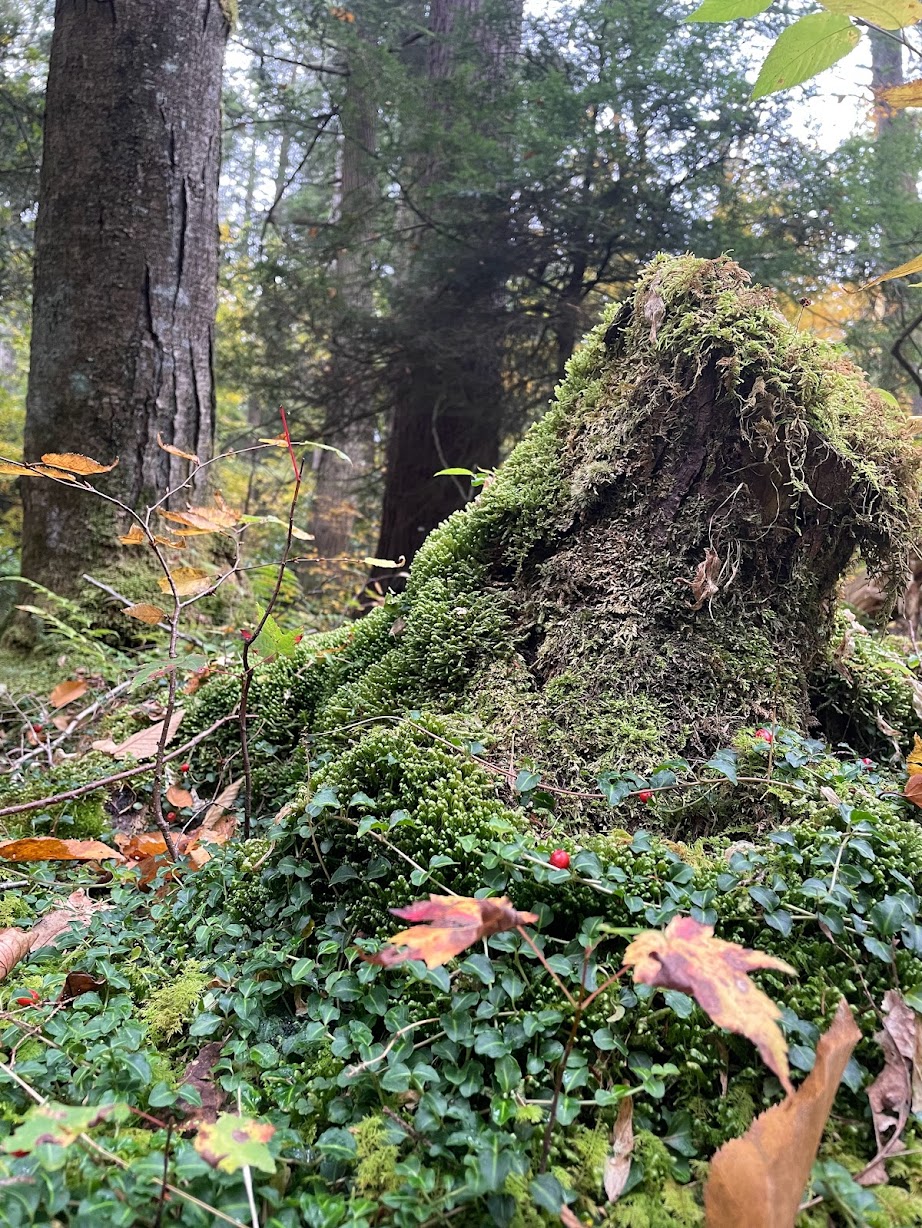
A New Work of Mercy: Caring for Our Common Home
“The love for God and neighbor was the characteristic of the first Christians. This love was expressed through the daily practice of the Works of Mercy. To feed the hungry, to clothe the naked, to shelter the homeless, to instruct the ignorant at a personal sacrifice.” -Peter Maruin, Easy Essays
I was in graduate school when Pope Francis published Laudato Si, his letter about Caring for our Common Home in the midst of ecological challenges. It was a great encouragement to me at the time because I was learning about soil degradation, climate change, and the whole host of accelerated problems that farmers are facing worldwide. I had only joined the Catholic Church a few years ago at that point, and it was so encouraging to hear the leader of my church addressing the severity of the ecological crisis, but doing so with an attitude of faith and hope.
A year later, in 2016, Pope Francis announced something that not as widely known but I believe will have an even deeper impact on the history of the Catholic Church. Pope Francis proposed “care for our common home,” or integral ecology, as a new Work of Mercy. This blew my mind! In the midst of what seemed like an ordinary speech, the Pope introduced substantial change to Catholic theology, which typically changes at a glacially slow pace.
For those that are not familiar with the Works of Mercy, the Catholic tradition has taught seven spiritual and seven corporeal (or bodily) works of mercy for hundreds of years. They were first enumerated as sets by Thomas Aquinas in the thirteenth century, but they are all based on the Bible. The Corporal Works of Mercy come mostly from the parable of the Sheep and the Goats in the Gospel of Matthew (which we talked about in the last blog post on material and spiritual poverty). The Spiritual Works of Mercy come from various passages in the New and Old Testament. The corporal works include feeding the hungry, giving drink to the thirsty, clothing the naked, harboring the homeless, visiting the sick, ransoming the captives, and burying the dead. The spiritual works include instructing the ignorant, counseling the doubtful, comforting the sorrowful, reproving the sinner, forgiving injuries, bearing with those who trouble and annoy us, and praying for all (ST II-II, Q 32, A 2).
What is merciful about caring for our common home? Shouldn’t our neighbors, and not the earth, be the objects of our mercy?In his September 1, 2016 address, Pope Francis explains: “We usually think of the works of mercy individually and in relation to a specific initiative: hospitals for the sick, soup kitchens for the hungry, shelters for the homeless, schools for those to be educated, the confessional and spiritual direction for those needing counsel and forgiveness… But if we look at the works of mercy as a whole, we see that the object of mercy is human life itself and everything it embraces.”
In the Gospel of Luke, a lawyer asks Jesus, “Who is my neighbor?” When Jesus responded with the parable of the Good Samaritan, he expanded the concept of neighbor to include anyone we might encounter, even those considered enemies. Until the last few hundred years, most people had a local sphere of influence. It was sufficient to love your immediate neighbor as yourself. But in our globalized economy, we purchase products and participate in systems that affect our brothers and sisters in the farthest reaches of the planet, most of whom we will never meet. In proposing care for our common home as a work of mercy, Pope Francis is inviting us to expand our concept of neighbor yet again.
One example of the importance of caring for our common home as a work of mercy is the harm caused by agricultural pesticides, not just for those who consume the food, but for those who work in the fields. Some people buy organic produce primarily to avoid exposure to pesticides, and for that reason they prioritize certain crops, like strawberries, to buy organically because they have higher levels of pesticide residues. Bananas, on the other hand, have a thick peel, so pesticide exposure is lower if you’re eating bananas that have been chemically sprayed. What people with this mindset don’t consider is that the skin of the people working on the banana plantations isn’t any thicker than that of the workers in the strawberry fields. When I did an internship at a non-profit in Panama, I heard stories from farmers and workers who suffered from cancer after working for the larger banana plantations. I remember one story in particular of a man who died young because he was the one who waved the flag on the ground to signal where planes should spray, and his only protection from the spray was to duck under the flag. This is just one of many examples of how interconnected everything is, and how one small choice, like buying organic bananas, can nudge the food system in a direction that reflects a deeper care and respect for our brothers and sisters around the world.
Furthermore, Pope Francis introduced this new work of mercy as a ‘complement’ to the traditional sets. This word comes from the Latin complere, which means to fill up, or to complete. In a sense, care for our common home is the seed-bearing fruit of the other works of mercy. The other works of mercy can’t be completed without it because God’s creation is the very medium through which we interact with and care for our neighbors. We cannot feed the hungry if our topsoil is eroded. We cannot give drink to the thirsty if we pollute our water. We cannot welcome the stranger if our house is in disarray. We cannot counsel the doubtful among the next generation if by our wasteful lifestyles we leave them a damaged earth less able to reflect the glory of the Creator (Romans 1:20).
Finally, Pope Francis explained that care for our common home is both corporal and spiritual in nature. Given that we started with fourteen, does this mean that we now have a total of fifteen, sixteen, or somehow still fourteen works of mercy? Regardless of how you choose to enumerate them, there are many ways to practice this new work of mercy in daily life.
Living on a farm provides abundant opportunities to practice caring for our common home as a corporeal work of mercy. Some of these include farming organically, removing invasives, planting native vegetation, providing spaces for animals and humans to thrive. We practice caring for our common home as a spiritual work of mercy when we prioritize making time for visitors to come to the farm, see the animals, work in the soil, and walk through the woods. God speaks through these experiences.
Taking good care of our common home helps us practice the other seven corporeal works of mercy as well: We feed the hungry by donating and offering produce on a sliding scale. We give drink to the thirsty by using aquatic plants to filter the water that runs through our pond and into the Prettyboy Reservoir. We clothe the naked by keeping a collection of shoes and coats in the mudroom available for volunteers and other visitors who may not have dressed for the weather. We harbor the homeless whenever we can by hosting people who are between jobs or trying to take a break from “normal” life and want to experience the satisfying work of manual labor in the context of a community. We visit the sick by providing healing opportunities for those with mental health issues. We ransom the captives who feel trapped and overworked by stressful jobs in healthcare, education, or industry. We bury the dead whenever an animal dies on our farm, or we encounter a dead bird or rodent, we bury it and say the Saint Francis prayer.
As for spiritual works, we instruct the ignorant by leading educational farm tours. We counsel the doubtful by living out the best example we can of Christian life for our volunteers and visitors. Many a good spiritual conversation can arise from weeding a long row of beets or onions. We comfort the sorrowful by sharing our own joys and sorrows with our guests. We reprove sinners as gently as possible when problems within our community arise, acknowledging that we are all sinners. We forgive injuries when people make mistakes. We bear with those who trouble and annoy us when we welcome people who are struggling with life and can’t always be their best selves. And we pray for all when we practice ten minutes of silent prayer each morning, and we invite anyone who is living with us to join. Something wonderful about the works of mercy is that they are such a simple and accessible way to live out our faith.
Organic Practices
As a former organic certifier, I know and follow the National Organic Program Standards with the minor exception of using Veteran Compost's locally sourced food waste compost. This compost contains minute amounts of biodegradable bioplastics that are technically not on the National List of allowed synthetics, and hence the compost is disqualified from use.
Crop Rotation and Cover Crops
We plan our plots carefully so we can rotate plant families. By changing the location of plant families each year, we prevent the buildup of pest and disease populations. In conjunction with cover cropping, this practice gives the soil time to rest and rebuild it's nutrient base. We also select crop varieties that have natural disease resistance and are adapted to local conditions.
Integrated Pest Management
We plant wildflowers to attract beneficial insects and do not use synthetic pesticides or herbicides anywhere on our property. Keeping a health, balanced ecosystem minimizes the need for these inputs. When necessary, we do make use of natural fungicides like Regalia, which is a natural plant extract that is harmless to humans, animals, and insects.
Nutrient Cycling
We love compost! We compost our food scraps and vegetable food wastes, so we are sure to return to the soil what we take from it. We keep our animal manure compost in a separate pile for use on landscaping to minimize food safety risks.
Animal Care
Our lovely flock of laying hens enjoy a large paddock to roam. They get organic feed, and their diet is supplemented with insects that they forage and scraps of produce from the farm. We'll add another paddock and expand the flock next year.
